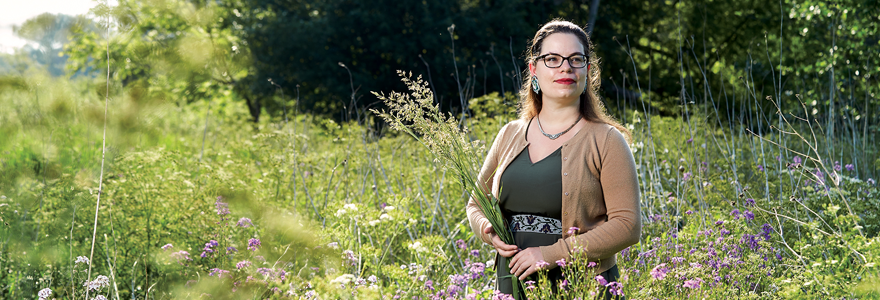Pathology professor contributes to ‘sacred work’ of investigating missing Indigenous children
 For Dr. Rebekah Jacques, building relationships of respect with Survivors, families and communities is paramount to the National Advisory Committee's work and the process of reconciliation. (Nation Wong)
For Dr. Rebekah Jacques, building relationships of respect with Survivors, families and communities is paramount to the National Advisory Committee's work and the process of reconciliation. (Nation Wong)
By Emily Leighton
Content warning: This article includes information about residential schools, missing children and unmarked burials.
The National Indian Residential School Crisis Line is available at all times, free of charge: 1-866-925-4419. Free support is also available through the Hope for Wellness chatline at 1-800-721-0066 or using the chat box at hopeforwellness.ca.
An empty chair sits at the front of the room, draped in colourful blankets and surrounded by offerings of feathers, moccasins and other special objects. Present at every National Gathering on Unmarked Burials across the country, the chair represents the children who never returned home from Canada’s residential schools.
“This is sacred work,” said Dr. Rebekah Jacques, professor in Pathology at Schulich Medicine & Dentistry and member of the National Advisory Committee on Residential Schools Missing Children and Unmarked Burials.
“Families have spent their whole lives wondering what happened to their children. Reconciliation is a process; a good way to start is by giving families their children back.”
Established in 2022, the National Advisory Committee provides Indigenous communities access to independent and expert information in their efforts to identify, locate and commemorate their missing children. Guided by a Circle of Survivors and composed mostly of Indigenous people, it brings together experts in Indigenous laws and cultural protocols, forensics, archeology, archival research, criminal investigations and communication.
As a forensic pathologist, Jacques is providing support and guidance to communities in their decision-making around burial sites, exhumation and identification of remains.
“Forensics is a truth-finding tool,” she said. “Many people think of forensic work as contributing to the legal system because forensic experts serve as credible sources of evidence that may be used in the legal system to support claims of truth. But there’s always been a humanitarian element to our work. It’s part of our job to identify the person who has died, so they can be returned to their families and commemorated according to their value system and traditions.”
More than 150,000 First Nations, Métis and Inuit children were removed from their homes and communities to attend residential schools between the 1870s and 1990s. Thousands never returned – and many children were buried in gravesites that are unrecorded, unmarked and unprotected.
The strength Survivors show in the face of huge adversity, their commitment and mentorship, it inspires me and motivates me to do this important work.
—Rebekah Jacques
In its first year, the Committee launched a website with a collection of resources and other materials, including a navigator document to introduce the options that families and communities may wish to consider in the search for their missing children. Members also hosted a community engagement event in Yellowknife earlier this year, as well as participated in several National Gathering events organized by the Office of the Special Interlocutor for Missing Children, Unmarked Graves and Burial Sites.
In her role, Jacques authored an internationally peer-reviewed paper on forensics and the identification process. The forward for the paper was written by a United Nations Special Rapporteur.
She also met with death investigation authorities across Canada to better understand how they interpret their roles with respect to the search efforts of unmarked burials. Currently, there is no national death investigation system or legal framework, which leaves communities navigating complicated procedures and variable policies.
“For me, this work extends beyond residential schools, as it’s also an opportunity to build death investigation systems that better support Indigenous communities moving forward,” she said. “We’ve seen from the National Inquiry into Missing and Murdered Indigenous Women and Girls the serious concerns communities have in interacting with authorities and, particularly, law enforcement in medicolegal death investigation.”
Jacques is also advocating for a national DNA strategy to identify children and return them to their families and communities. There isn’t an existing Indigenous DNA database in Canada that can be used for this purpose, and there are important ethical considerations before one can be established.
“Indigenous people have not been treated well by any colonial constructs in Canada,” she explained. “Thinking about giving a DNA sample is really embedded in that. There is also the implication that in providing a sample, people may feel they are admitting to losing hope that their loved one is still alive.”
From Jacques’ perspective, many additional challenges remain for the Committee in the months and years ahead, including aging Survivors, access to sites of interest on private and corporate land, access and protection of records, access to qualified experts, data sovereignty, long-term funding, and health and wellness supports.
“There’s much more to do to address these outstanding issues,” said Jacques. “Canada is so large and there were so many residential schools; we’ve really just started.”
Jacques, a citizen of the Métis Nation of Ontario, is also concerned by the increase in denialism expressed by some Canadians and its impact on Indigenous communities.
“Survivors are being denied their lived experience,” she explained. “Denialism is the last stage of genocide. Imagine going through this, losing your loved ones in this way, and then being told, ‘I don’t believe you’ despite the findings of the Truth and Reconciliation Commission (TRC).”
In its 2015 final report, the TRC wrote that “without truth, justice is not served, healing cannot happen, and there can be no genuine reconciliation.”
For Jacques, building relationships of respect with Survivors, families and communities is paramount to the Committee’s work and fundamental to the process of reconciliation.
“The strength Survivors show in the face of huge adversity, their commitment and mentorship, it inspires me and motivates me to do this important work.”









